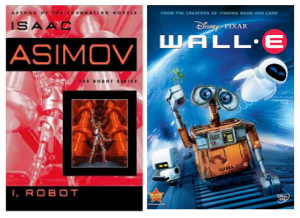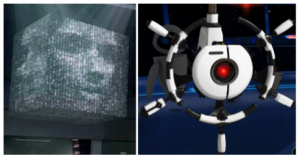Robot Wars
Posted by on Thursday, February 9th, 2012 at 2:36 amIf a Neo-Luddite would term Frankenstein a cautionary tale, a warning to those whose “hubris” (as Dan termed it) in developing artificial intelligence blinds them to its in inherent dangers, then what would they think of such problematic fiction as Asimov’s I, Robot or Disney’s WALL-E?
 Both stories share a similar plot line: man invents machines, machines pose threat to man, a dissident machine rises up, saves man, and restores ‘natural order.’ Another parallel emerges in that both the machines of I, Robot and WALL-E receive programming from their human operators stating their primary function as human preservation and service (Asimov’s Three Laws of Robotics and the directives given to various robots in WALL-E).
Both stories share a similar plot line: man invents machines, machines pose threat to man, a dissident machine rises up, saves man, and restores ‘natural order.’ Another parallel emerges in that both the machines of I, Robot and WALL-E receive programming from their human operators stating their primary function as human preservation and service (Asimov’s Three Laws of Robotics and the directives given to various robots in WALL-E).
In I, Robot the super-computer V.I.K.I. ultimately identifies the most dangerous threat to humanity as people themselves. Logically, then, human beings must be severely limited and monitored for their own protection, resulting in robots ruling with iron fists. Though a rather frightening realization of Brautigan’s machines of loving grace, the androids of I, Robot really do have humanity’s best interest at heart. Likewise in WALL-E, the navigational component AUTO is following an outdated directive to avoid returning to earth, as it is supposedly unable to support human life. Hence he attempts to bar the ship’s captain from steering humanity home.
 Though human beings do revolt in both stories, in true Neo-Luddite fashion, their feeble attempts are almost comical. The baseball-bat-swinging Chicagoan mob of I, Robot puts up a much better fight than the corpulent hover-chair-dwellers of WALL-E, but in both cases a cybernetic savior is needed. However, these cybernetic saviors’ ability to triumph rests in their distinctly human-like qualities. An unlikely hero, the plucky WALL-E saves the day by exhibiting one of the most laudable traits of self-sacrifice, a characteristic developed in earlier moments in the film when WALL-E expresses one of the basest of human desires in his longing for companionship, more specifically, the love of Eve. In his ability to love, WALL-E recognizes the worth of the greater good and willingly sacrifices himself for it. I, Robot’s much more complex hero, the android Sonny, also displays a broad spectrum of emotions throughout the film – anger, sadness, even conspiratorial trust. He is differentiated from homogeneous swarms of his hostile brethren by the fact that he is not only programmed with the Three Laws, but he has been endowed with the ability to choose to ignore them. Sonny’s creator, Dr. Lanning, endowed Sonny with reason and free will (two emphatically human rights), coupled with his ability to dream (which begs the question: Can a robot not only achieve the semblance of cognizance, but also delve into the subconscious?). Sonny is also given a predestined purpose, which manifests itself in his ability to defeat the rampaging V.I.K.I. through yet another show of willing self-sacrifice. When V.I.K.I. attempts to dissuade Sonny from his intent, questioning, “Do you not see the logic of my plan?” he thoughtfully replies, “Yes, but it just seems too heartless.”
Though human beings do revolt in both stories, in true Neo-Luddite fashion, their feeble attempts are almost comical. The baseball-bat-swinging Chicagoan mob of I, Robot puts up a much better fight than the corpulent hover-chair-dwellers of WALL-E, but in both cases a cybernetic savior is needed. However, these cybernetic saviors’ ability to triumph rests in their distinctly human-like qualities. An unlikely hero, the plucky WALL-E saves the day by exhibiting one of the most laudable traits of self-sacrifice, a characteristic developed in earlier moments in the film when WALL-E expresses one of the basest of human desires in his longing for companionship, more specifically, the love of Eve. In his ability to love, WALL-E recognizes the worth of the greater good and willingly sacrifices himself for it. I, Robot’s much more complex hero, the android Sonny, also displays a broad spectrum of emotions throughout the film – anger, sadness, even conspiratorial trust. He is differentiated from homogeneous swarms of his hostile brethren by the fact that he is not only programmed with the Three Laws, but he has been endowed with the ability to choose to ignore them. Sonny’s creator, Dr. Lanning, endowed Sonny with reason and free will (two emphatically human rights), coupled with his ability to dream (which begs the question: Can a robot not only achieve the semblance of cognizance, but also delve into the subconscious?). Sonny is also given a predestined purpose, which manifests itself in his ability to defeat the rampaging V.I.K.I. through yet another show of willing self-sacrifice. When V.I.K.I. attempts to dissuade Sonny from his intent, questioning, “Do you not see the logic of my plan?” he thoughtfully replies, “Yes, but it just seems too heartless.”
Both stories are problematic in their depictions of human-robot amalgamations. The stories’ villains are humanized (they are given names and voices), while the heroes go even further and present as manifestations of humans themselves. But really, can threatening technology be neutralized by technology that is more empathetic, more human? Taking into account that both cases, like the Morris worm, contain human error at their cores (V.I.K.I.’s logical conclusion was an inevitable result of her programming, and AUTO’s directive was straight from the mouths of humans), is it really a technological battle at all? I mean, what kind of battle is it where a human-created robot, operating on human-generated parameters, infringes on human rights and is subsequently destroyed by an altered, yet still human-created, robot, also operating on human-generated parameters? It almost seems to be a gigantic battle game – will love triumph over logic, does self-sacrifice trump self-destruction? – with the all-too-human warfare of vices and virtues played out on a grander technological stage.
You can follow any responses to this entry through the RSS 2.0 You can leave a response, or trackback.


I’ll be interested to see if you think that the dynamic you elucidate here is extensible to The Matrix.
Pingback: Robot Revolution - Technoromanticism
Pingback: lustro piotrków